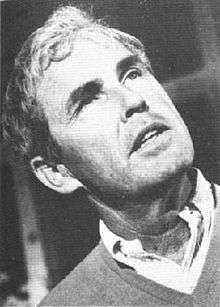Robert Parrish
| Robert Parrish | |
|---|---|
 | |
| Born |
Robert R. Parrish January 4, 1916 Columbus, Georgia, United States |
| Died |
December 4, 1995 (aged 79) Southampton, Long Island, New York |
| Occupation | Film director, editor, writer, child actor |
| Years active | 1927–83 |
| Home town | Los Angeles, California |
| Spouse(s) | Kathleen Norris Parrish |
| Parent(s) | Gordon R. and Laura R. Parrish |
| Family | Helen Parrish (sister) |
| Awards | Academy Award for Film Editing (1947) |
Robert R. Parrish (January 4, 1916 – December 4, 1995) was an American film director, editor, writer, and child actor. He received an Academy Award for Film Editing for his contribution to Body and Soul (1947).
Life and career
Born in Columbus, Georgia, Parrish was the son of factory cashier Gordon R. Parrish and actress Laura R. Parrish. The Parrish siblings, including Beverly and Helen, entered into acting in the 1920s when the family moved to Los Angeles. Parrish made his debut film appearance in the Our Gang short Olympic Games (1927). He then appeared in the anti-war film All Quiet on the Western Front (1930), Charles Chaplin's City Lights (1931), and several films for director John Ford.
Filmmaking
Ford later hired Parrish as assistant editor for Mary of Scotland (1936) and sound editor for Young Mr Lincoln (1939); Parrish's other work for Ford included Drums Along the Mohawk (1939) and The Grapes of Wrath (1940). Both had served in the United States Navy during World War II, and together they also produced a number of documentary and training films, including The Battle of Midway (1942).
In 1947, Parrish shared the Academy Award, with co-nominee Francis Lyon, for his film editing debut in Robert Rossen's boxing drama Body and Soul. Parrish's second Academy Award nomination, shared with Al Clark, was for the political drama directed by Rossen, All the King’s Men (1949). In the first versions done by Al Clark, the film was poorly received by preview audiences and studio executives. Parrish discovered that a "montage approach" was much more successful, with arbitrary cuts made a set time before and after each important action. In addition to the editing nomination for Clark and Parrish, the film won the Best Picture Award outright and was a popular success.[1]
Parrish made his directorial debut with the revenge drama Cry Danger (1951). The Purple Plain (1954) was nominated for the Award for Best British Film at the 8th British Academy Film Awards. One of Parrish's best-known works is the James Bond parody Casino Royale (1967), he among its five directors. His final film, co-directed by Bertrand Tavernier, was Mississippi Blues (1983).
Memoirs
Summing up Parrish's career, Allen Grant Richards commented that "Other than his excellent editing work and early directing, Parrish may be most remembered as storyteller from his two books of Hollywood memoirs."[2] Filmmaker Kevin Brownlow wrote of Parrish's first memoir, Growing Up In Hollywood (1976), "His stories about these pictures were marvellous in themselves, and he often came at them sideways, so not only the punchline but the situation took you by surprise. We all entreated him to write them down and in 1976 he did so, producing one of the most enchanting - and hilarious - books about the picture business ever written [...] [Growing Up In Hollywood] ought to be reprinted in this centenary [birth] year."[3] The sequel, Hollywood Doesn't Live Here Anymore (1988), followed.
Selected filmography
Director
- The Mob (1951)
- Cry Danger (1951)
- Remember That Face (1951)
- Assignment – Paris! (1952)
- My Pal Gus (1952)
- Rough Shoot (1953)
- The Purple Plain (1954)
- Lucy Gallant (1955)
- Fire Down Below (1957)
- Saddle the Wind (1958)
- The Wonderful Country (1959)
- In the French Style (1963)
- Up from the Beach (1965)
- Casino Royale (1967)
- The Bobo (1967)
- Duffy (1968)
- Doppelgänger (1969)
- A Town Called Bastard (1971)
- The Marseille Contract (1974)
Editor
- The Battle of Midway (1942)
- How to Operate Behind Enemy Lines (1943)
- German Industrial Manpower (1943)
- December 7th (film) (1943)
- That Justice Be Done (1945)
- The Nazi Plan (1945)
- A Double Life (1947)
- Body and Soul (1947; with Francis D. Lyon)
- No Minor Vices (1948)
- All the King's Men (1949; with Al Clark)
- Caught (1949)
- No Sad Songs for Me (1950; with W. Lyon)
- Of Men and Music (1951)
Autobiographies
- Growing Up In Hollywood. New York: Harcourt, Brace, Jovanovich. 1976. ISBN 0-586-04859-6. OCLC 1659633.
- Hollywood Doesn't Live Here Anymore. Boston: Little, Brown. 1988. ISBN 0-316-69255-7. OCLC 16901046.
References
- ↑ Eagan, Daniel (2010). America's Film Legacy: The Authoritative Guide to the Landmark Movies in the National Film Registry. A&C Black. p. 429. ISBN 9780826429773.
- ↑ Richard, Allen Grant (2000). "Robert Parrish". In Pendergast, Tom; Pendergast, Sara. International Dictionary of Film and Filmmakers, Edition 4. St. James Press. ISBN 978-1-55862-449-8. Retrieved 2009-09-01.
- ↑ Brownlow, Kevin (December 11, 1995). "Obituary: Robert Parrish". The Independent.
Further reading
- Holmstrom, John (1996). The Moving Picture Boy: An International Encyclopaedia from 1895 to 1995. Norwich: Michael Russell. p. 71. ISBN 9780859551786. OCLC 37491135.
- van Gelder, Lawrence (December 6, 1995). "Robert Parrish, 79, Film Editor-Director, Dies". The New York Times.